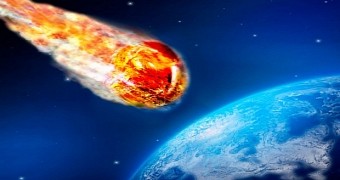Scientists with JAMSTEC (the Japan Agency for Marine-Earth Science and Technology) and Nagoya University think to have solved a long-standing riddle: how life emerged on our planet.
In a report released this Wednesday, the team explain that, having carried out a series of experiments in laboratory conditions, they found evidence that it was probably comets that seeded our planet with life.
If it was indeed such collisions that birthed Earth's first microscopic inhabitants around 4 billion years ago, this would mean it might be possible that comets also delivered life to other planets in deep space.
How the experiments played out
As part of their investigation, the scientists started by creating mixtures of amino acids, water ice and silicate. The concoctions were then exposed to cryogenic conditions. Once frozen, they were fired at with a propellant gun in an attempt to simulate the shock of a comet crash.
When analyzing the compounds resulting from these controlled impacts, the researchers identified peptides of up to 3 units long. Like proteins, peptides are essentially chains of amino acids. What sets them apart is their size, with peptides comprising fewer amino acids than proteins.
Speaking at this year's Goldschmidt Conference in Prague, organized by the Geochemical Society and the European Association of Geochemistry, the team proposed that, over time, such peptides formed by comet impacts might have come together to form longer structures, possibly even proteins.
“This finding indicates that comet impacts almost certainly played an important role in delivering the seeds of life to the early Earth,” said JAMSTEC researcher Haruna Sugahara.
“It also opens the likelihood that we will have seen similar chemical evolution in other extraterrestrial bodies, starting with cometary-derived peptides,” the specialist went on to explain.
The jury is still out on the issue
Interestingly, this report detailing how comet impacts might have given rise to the chemical building blocks of life here on our planet follows another study that was published just days ago and which proposes that it was meteorites that seeded Earth with life.
Since meteorites are essentially comet or asteroid fragments, it would appear that these independent investigations both produced evidence in support of the same hypothesis: that it was collisions with objects from deep space that made it possible for life to emerge on our planet.
Be that as it may, it's all theoretical talk, at least for the time being. Scientists are yet to find a smoking gun and prove beyond a shadow of a doubt that life on Earth really did come from space, or that meteorites, comets or other cosmic bodies had anything to do with it.

 14 DAY TRIAL //
14 DAY TRIAL //